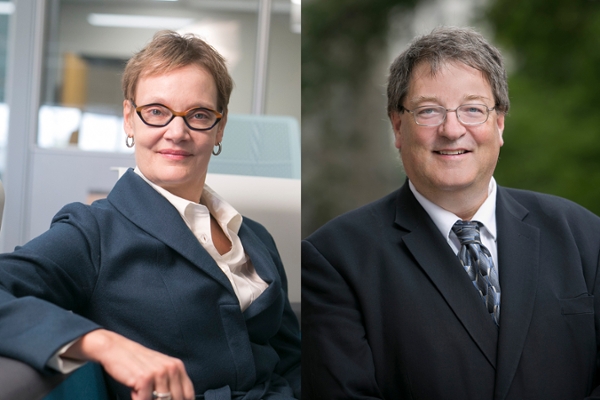
New and renewed CRC appointments in Climate Change and Regional Innovation announced in the Johnson Shoyama policy school
Dr. Margot Hurlbert (PhD), professor in the Johnson Shoyama Graduate School of Public Policy (JSGS) and Fedoruk Fellow in the Centre for the Study of Science and Innovation Policy, has been awarded a Tier 1 Canada Research Chair (CRC) in Climate Change, Energy and Sustainability Policy. This announcement comes alongside the renewal of Dr. Ken Coates’ Tier 1 CRC appointment in Regional Innovation. Each professor will receive $1.4 million over seven years to pursue their research.
Dr. Margot Hurlbert (PhD), professor in the Johnson Shoyama Graduate School of Public Policy (JSGS) and a Fedoruk Fellow in the Centre for the Study of Science and Innovation Policy, has been awarded a Tier 1 Canada Research Chair (CRC) in Climate Change, Energy and Sustainability Policy. This announcement comes alongside the renewal of Dr. Ken Coates’ Tier 1 CRC appointment in Regional Innovation. Each professor will receive $1.4 million over seven years to pursue their research.
Hurlbert, is a coordinating lead author of the Intergovernmental Panel on Climate Change’s (IPCC) Special Report on Land and Climate. Her research focuses on addressing the gap between current policy and behaviour, and understanding what is needed to address climate change.
“This is critical policy creation in a jurisdiction that necessitates the expertise of an internationally respected scholar of Dr. Hurlbert’s calibre,” says Kathy McNutt, Interim Vice-President (Research) at the University of Regina. “Her highly respected work with the IPCC is just one example of her commitment to making her research count towards solving the problem of climate change, as well as equipping our students with the tools to make a difference in the world.”
Solving climate change is a complex problem plagued by questions of which technologies best address the problem (wind, solar, hydro or nuclear power), which technologies people might accept (electric versus hydrogen fueled cars), what behavioural changes people will be willing to adopt (vegetarianism or ride sharing), and which policy instruments best address the problem (carbon tax versus cap and trade). These decisions are further complicated by considerations of the impacts of climate change including increased drought, flood, fires, and changes in river flows, land degradation, desertification, and challenges of food security.
“I am particularly interested in how policy interacts with the actions of individuals and organizations to either reinforce the social, technical, and economic structures of society—which cements carbon dependency—or to create new structures that lead to a sustainable energy future,” says Hurlbert.
Hurlbert says that an important part of her work will be to engage citizens in decision-making, and in group-learning sessions, so ideas and information can be exchanged through dialogue and debate. She will also examine how people perceive and tolerate risk.
“The carbon tax is something that our policy studies support, and there are a lot of technologies that will move us to zero carbon, like electric cars. So while we can link technology and policy, because this is also about choices and transformative change, we must also link people with those policies and technologies,” explains Hurlbert.
“Dr. Hurlbert’s research is an indication of the policy impact that the school is having,” says Murray Fulton, JSGS director, University of Saskatchewan (USask) campus. “Combined with Dr. Coates’ work with rural, remote and Indigenous communities, the JSGS is addressing a number of the wicked problems facing today’s society."
Dr. Ken Coates (PhD), Canada Research Chair in Regional Innovation at the school’s USask campus, is conducting research that identifies barriers preventing rural and remote communities from reaping the benefits of scientific and technological innovation enjoyed in more metropolitan areas.
“Attempts to build a new economy centered on scientific and technological innovation have failed in rural areas of Canada because they lack capacity and skilled workforces, access to research, and the resources to commercialize discoveries,” says Coates. “Since such opportunities are clustered in metropolitan areas, a major innovation divide has opened up in Canada that is growing by the year.”
Working with Indigenous groups, northern and rural communities, business groups, and provincial and federal governments, Coates examines innovation-based investment, skills training and entrepreneurship in non-metropolitan areas. He is also looking at best practices in other countries and is coordinating international efforts to encourage the use of new technologies in rural and remote regions in Canada.
“To enhance Indigenous economic and governance development, community leaders need to be in a central role in the research process, ensuring that the research contributes to local priorities and supports regional capacity building,” says Coates. “By working collectively, we are finding local uses for technological innovations, improving local governance and building sustained economies.”
The combined $2.8 million in funding received by Hurlbert and Coates was part of a $275 million announcement made today by Canada’s Science and Sport Minister Kirsty Duncan to support new and renewed CRCs at 52 institutions.
The Government of Canada created the CRC program in 2000 to attract and retain some of the world’s most accomplished and promising minds and to boost Canada's competitiveness in the global knowledge-based economy.
Read more:
- Government of Canada announces talented and diverse group of new and renewed Canada Research Chairs
- $ 6 million awarded for Canada Research Chairs at USask
- U of R announces Canada Research Chair in Climate Change, Energy, and Sustainability Policy
For more information, contact:
Erica Schindel, Communications and Marketing Specialist
Johnson Shoyama Graduate School of Public Policy
University of Saskatchewan campus
306-966-2663 | erica.schindel@usask.ca

